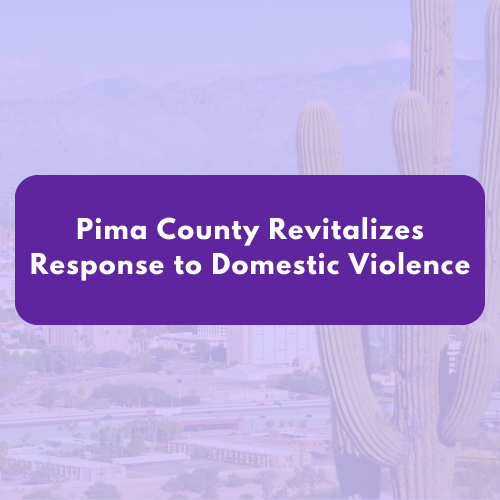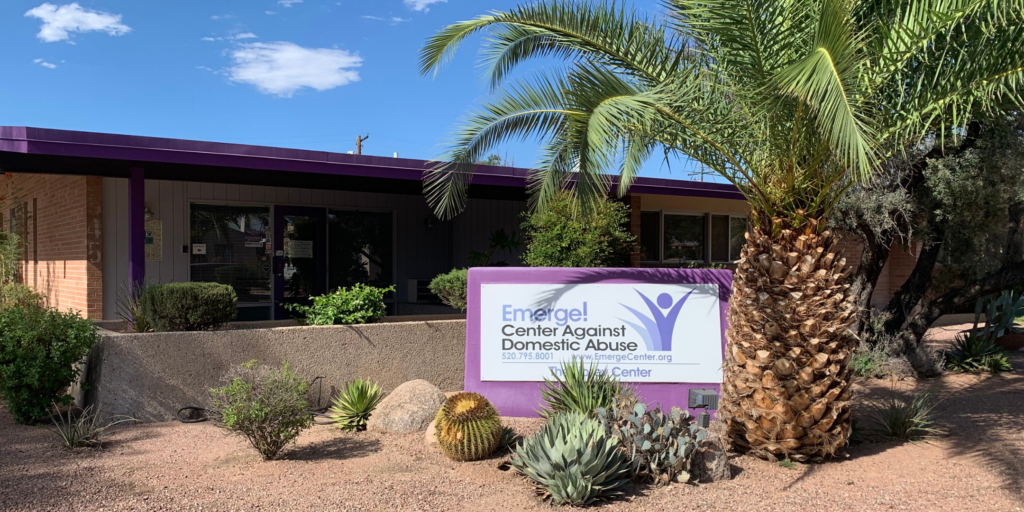Today, the Supreme Court ruled to uphold the federal statute prohibiting individuals convicted of misdemeanor domestic violence (DV) crimes or who are subject to a DV restraining order (DVRO) from possessing firearms. This decision underscores the importance of systemic protections for people experiencing abuse—and the potential danger victims face when systems fail them. Emerge Center Against Domestic Abuse is proud to announce that Pima County has also reaffirmed its commitment to supporting DV survivors.
In recent years, while families continued to lose loved ones to the epidemic of domestic abuse, Pima County’s coordinated response to DV has languished. Fortunately, Pima County has revitalized its DV response through a partnership between organizations including Emerge, Tucson City Court’s DV Court, Southern Arizona Legal Aid, Southern Arizona Center Against Sexual Assault (SACASA), Tucson Police Department, and the Pima County Sheriff’s Office. Together, these partners will rebuild the county’s DV response system—and grow it to involve a more diverse group of individuals and organizations in solving the community problem of intimate partner violence.
When domestic abuse escalates to the point of a 911 response, multiple community organizations can become involved and have an impact on a survivor’s safety—for better or for worse. A Coordinated Community Response (CCR) approach to addressing DV brings together a multi-disciplinary group of agencies within law enforcement, survivor advocacy programs, and the criminal justice system to work together, implementing tools and processes designed to improve safety and accountability.
“When a community’s CCR is not active, there is great impact to how accessible safety and support are for survivors,” said Anna Harper, Executive Vice President and Chief Strategy Officer at Emerge. “We begin to see things like a lack of attention to the impact of felony declinations, lack of training that results in racial bias and injuries being overlooked with Black women, arrest and prosecution of victims who were left to defend themselves, and a lack of attention to the risk associated with firearms.”
While DV survivors in Pima County once benefited from a robust CCR, changes in leadership, staffing challenges, and impacts from the COVID-19 pandemic gradually eroded the team’s structure. Emerge and community partners in criminal justice have worked together to serve DV survivors in Pima County over the last five years; however, the CCR has not grown to meet the immense need in the community.
With STOP Violence Against Women grant funding from the Governor’s Office of Youth, Faith, and Family, Emerge and local partners are revitalizing the local CCR Team and rebuilding vital programs including:
- Pima County’s Risk Assessment Protocol—to identify high-risk cases and ensure survivors have access to critical services
- Pima County DV’s Fatality Review Team—to identify risk factors, systems gaps, and areas for improvement
- Tucson City Court’s DV Offender Accountability Program—to improve the justice system response to DV through work with Abusive Partner Intervention Programs and providing support to high-risk victims
- Pima County’s DV Strangulation Protocol—to improve training and response to strangulation as an important indicator of risk for DV victims—with special emphasis on addressing racial bias in strangulation assessment
Each of these elements is designed to prevent DV homicides, with a focus on improving coordinated support for survivors identified as being at high risk of lethality, and centering the experiences of Black and Indigenous survivors, who are often at the greatest risk of lethal violence. Another area for growth in the CCR Team is to create a more comprehensive approach that includes participation from the broader community outside of the criminal justice system.
Emerge’s role on the team is to provide training and oversight to partners to ensure that DV survivors’ needs are addressed in a trauma-informed manner in other areas of the system. April Barbosa, founder of Justice for Rosaura, has joined Emerge as CCR Team Project Manager. In this role, she will continue her work of building connections and strengthening our community’s response to domestic abuse by helping to revitalize the CCR Team.
“This role is deeply personal to me, as I lost my daughter Rosaura to domestic abuse,” said Barbosa. “My family’s experiences have fueled my dedication to this work. I do this in Rosaura’s memory to help as many people as possible. I understand the critical importance of a united, community-wide approach to ensure the safety and well-being of survivors. My commitment is to build strong partnerships and help implement effective protocols that not only support survivors but also prevent future violence. Together, we can create a safer and more supportive environment for all members of our community.





